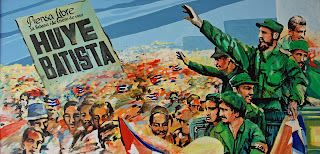Living in Revolution

I know most of us would not understand what is to live under the control of a regime. The Cuban regime as well as the North Korean, have been doing a great job with ideologizing of his people. From teaching the kids in the school to make big memorials, never letting its people forget under who orders the live by. I dare to say that most of the Cuban people have a big feeling of belonging and love for their history and also idolatry for their heroes like Ernesto 'Che' Guevara. El Che could be seen almost around Cuba (and other parts of the world) in big murals. Kids in the schools are taught to say recitals about Guevara and Castro just like in North Korea they do with Kim Jong-un.
